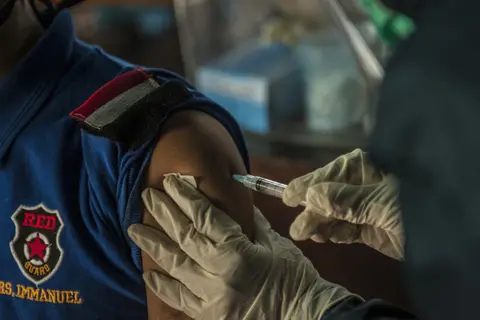
Muhammad Irfan Sembiring no longer boasts long dark hair, a ripped black T-shirt, and jeans. Instead, he is occasionally seen donning a robe and skullcap or turban when performing as a vocalist/guitarist with the Jakarta-based thrash-metal legend Rotor, which formed in 1991 and is still going strong, though less active than it used to be.
He is also one of a growing number of Indonesians who reject vaccination for
religious and political reasons.
Irfan, born in 1970, was like many Indonesians whose relationship with religion was
only on paper but rarely practiced it. It wasn’t until 1997 that he delved deeper into
Islam, the religion he was born into, after reading a biography of the Prophet
Muhammad at a bookstore in Jakarta. This happened shortly after he and the rest of
Rotor returned from San Francisco, where they had traveled in a bid to conquer the
US metal music industry.
Ever since then, while remaining a force in the heavy metal scene as a musician, Irfan’s image has gradually shifted to that of a prominent Islamic preacher. He often preaches about keeping healthy through Islam, obtained primarily through wudu (ablutions), a form of self-purification ritual using water.
“Most Muslims don’t know how to perform ablutions correctly as the Prophet Muhammad taught us,” Irfan told The Jakarta Post. “God willing, if you do it right, you will not get sick.”
Irfan has repeatedly encouraged his followers to use fennel flowers - a traditional
medicine popular since ancient Egypt - to cure illnesses. He denounces vaccines for
religious and political reasons.
“Everyone has a different type of body. Different people may handle the vaccines
differently. The government is supposed to give us options,” he said.
“There’s no single cure to combat illness. So why are we left with only one option
that is vaccination?”

but now spends more time preaching about religion.
(Courtesy of Irfan Sembiring/JP)
Indonesia has a long history of outbreaks. It was one of the 10 countries with the
most measles cases in 2015, according to the WHO, with more than 12,000 cases
each year since 2014.
The effort to eradicate measles, one of the oldest viruses known to humans, was
strongly rejected, particularly by Muslim groups as the vaccine contains forbidden
materials and was deemed haram by the Indonesia Ulema Council (MUI) following
the issuance of a fatwa.
A study published in The American Journal for Preventive Medicine concluded that between 1991 and 2017, measles vaccination increased in both Muslims and non-Muslims in Indonesia but has stagnated in recent years, due to increased attention among Muslim groups on haram materials in vaccines since 2017.
While the MUI fatwa is not legally binding, it is still seen by Muslims as an important
factor in helping them decide what is halal and what is haram.
So when the MUI ruled that the CoronaVac vaccine made by Chinese biopharmaceutical company Sinovac was safe and halal, there should not be a problem in the implementation of mass vaccination, right?
Turns out it isn’t that easy.
Spreading online
The anti-vaccine wave has spread to all corners of the globe in recent years,
including Indonesia. On social media platforms such as Facebook, communities
made up of anti-vaxxers are formed. Some groups have close to 3000 members.
In such groups, all kinds of anti-vaccine discourse and information on side-effects of vaccines are shared while pro-vaccine campaign posts are forbidden. In the "About" section, some of these groups use passages from the Quran to justify their beliefs that God has provided humans with enough natural resources to fight off illnesses.
While these groups are mostly private (meaning membership is moderated), some
posts can be publicly viewed. Many are filled with anti-vaccine memes and
disinformation about the danger of vaccines. Video with topics such as “'Mandated
vaccination? Get ready to say ‘no’" are shared.
Multiple attempts to get a comment from the groups' members and forum leaders
were left unanswered.
The situation is exacerbated by the circulation of hoaxes on social media related to
the vaccines. The Indonesian Anti-Slander Society (Mafindo) recorded 712 hoaxes
about COVID-19 vaccines between January and November 2020, while the
Communications and Information Ministry documented more than 2,000 hoax topics
related to COVID-19.
The impact of the anti-vaccine movement and hoaxes on the vaccine acceptance rate may need further study, but a survey conducted by the WHO, Unicef, the Health Ministry and the Indonesian Technical Advisory Group on Immunization (ITAGI) in September 2020 found that Aceh and West Sumatra provinces had the lowest acceptance rate, with 46 and 47 percent respectively.
The survey, involving more than 100,000 respondents across 34 provinces, however, found that the most common misgivings were related to safety (30 percent) and efficacy doubt (22 percent). While religious reasons made up just 8 percent.

including unproven information on side effects.
(Image by Muhammad Iqbal Kusumadirezza/JP)
Some politicians have openly expressed their rejection of the vaccine made by Sinovac. Ribka Tjiptaning, a member of House of Representatives Commission IX overseeing health and manpower, in early January criticized CoronaVac as “junk that even the Chinese don’t use,” as quoted by Bisnis.com. She refused to be inoculated and said she would rather pay the fine.
Natalius Pigai, a former commissioner of the National Commission on Human Rights
(Komnas HAM), on Jan. 18 strongly opposed the use of CoronaVac, stating that the
government should not force the public to use it.
Sinovac has been the subject of concerns and criticism, particularly over its data
transparency and confusing efficacy rates.
Authorities in Brazil reported a 50.4 percent efficacy rate during trials, while Turkey and Indonesia reported 91.25 and 65.3 percent respectively. Questions were raised over the efficacy rate, since only 1,620 people volunteered in Indonesia’s vaccine trials. Critics said most of the volunteers did not represent those vulnerable or at risk of the virus, such as health workers or informal workers.
Prima Agustiawan, a 33-year-old illustrator based in Palembang, South Sumatra, is one of those who are reluctant to get vaccinated with CoronaVac.
While he says he is not totally anti-vaccine, Prima admits, “My doubts about the
efficacy, especially of CoronaVac, may change over time when more information
becomes available.”
Prima also said vaccination was not the only solution, adding that following health
protocols while maintaining health was more essential during the pandemic.
Rini, a 38-year-old Tangerang housewife who does not want to use her real name,
says the government's lack of succinct and clear information rollout regarding the
vaccination is what makes people like herself more susceptible to misleading
information.
"The lack of confidence in the government makes it more tempting to believe random
online information such as that forwarded in WhatsApp groups. I understand it's
dangerous, but you can't fully blame people who feel like they're in the dark," she
says.
Siti Nadia Tarmizi, spokesperson for the Health Ministry's COVID-19 Response and
Economic Recovery Committee, said governments around the world, including in
Indonesia, were dealing with the anti-vaccine movement that has been around for
decades, and that most of them did not get enough information about vaccines.
“Low literacy is to blame,” Siti told The Jakarta Post. “We will disseminate more info. We have worked with influencers, public figures and use social media too.”
Aribowo Sasmito, one of the founders of Mafindo, said people shared hoaxes
because there had been a massive influx of anti-vaccine posts that flooded instant
messaging apps and social media.
“This is exacerbated by poor critical thinking,” Aribowo said. “While the government
should be more transparent and [improve] public communication.”
The chairman of the Indonesia Health Law Society (MHKI), Mahesa Paranadipa Maikel, said the government should work to bridge the gap of divisiveness among the multicultural populations.
“The government should step up its communication effort to spread awareness and information by involving civil organizations, local religious figures and stakeholders to increase the acceptance rate,” Mahesa told The Jakarta Post.
Mahesa further explained that overcoming health problems should go beyond both
religious and political realms, stating that health programs should be as inclusive as
possible.
“In some countries, vaccination is not a problem, because the public and the
government work together by implementing strict health protocols and data
transparency,” he added.
MUI secretary-general Amirsyah Tambunan said his institution had already stepped
up efforts to spread awareness at the regional level, particularly by involving
grassroots religious leaders.
“We have communicated with Islamic scholars in Saudi Arabia too,” Amirsyah said.
“The Sinovac vaccine is well accepted there, so we are trying to follow its steps.”
The government rolled out its mass vaccination program on Jan. 14, after the Food and Drug Monitoring Agency (BPOM) issued its emergency use authorization on Jan. 11. It secured 1.8 million doses in December 2020 for top officials and health workers across Indonesia, all of which are expected to be administered by April 2021.
The government has stated that, according to the Health Quarantine Law, those who reject vaccination may face up to one year in prison and a fine of Rp 100 million, another move facing further public criticism.
COVID-19 Update: The connection between local and global issues–the Pulitzer Center's long standing mantra–has, sadly, never been more evident. We are uniquely positioned to serve the journalists, news media organizations, schools, and universities we partner with by continuing to advance our core mission: enabling great journalism and education about underreported and systemic issues that resonate now–and continue to have relevance in times ahead. We believe that this is a moment for decisive action. Learn more about the steps we are taking.










